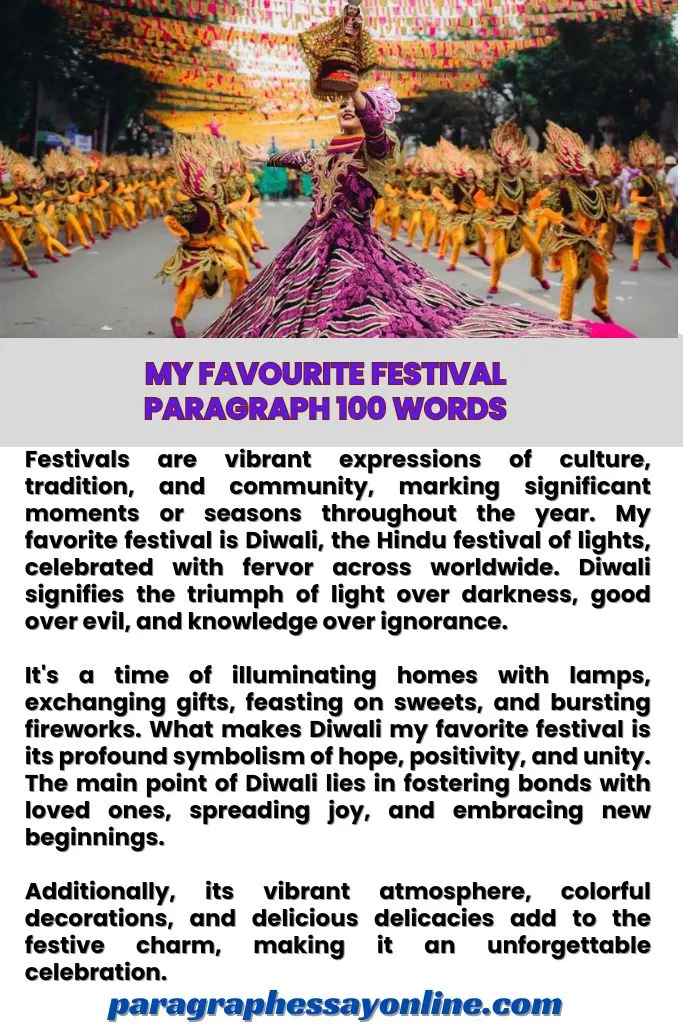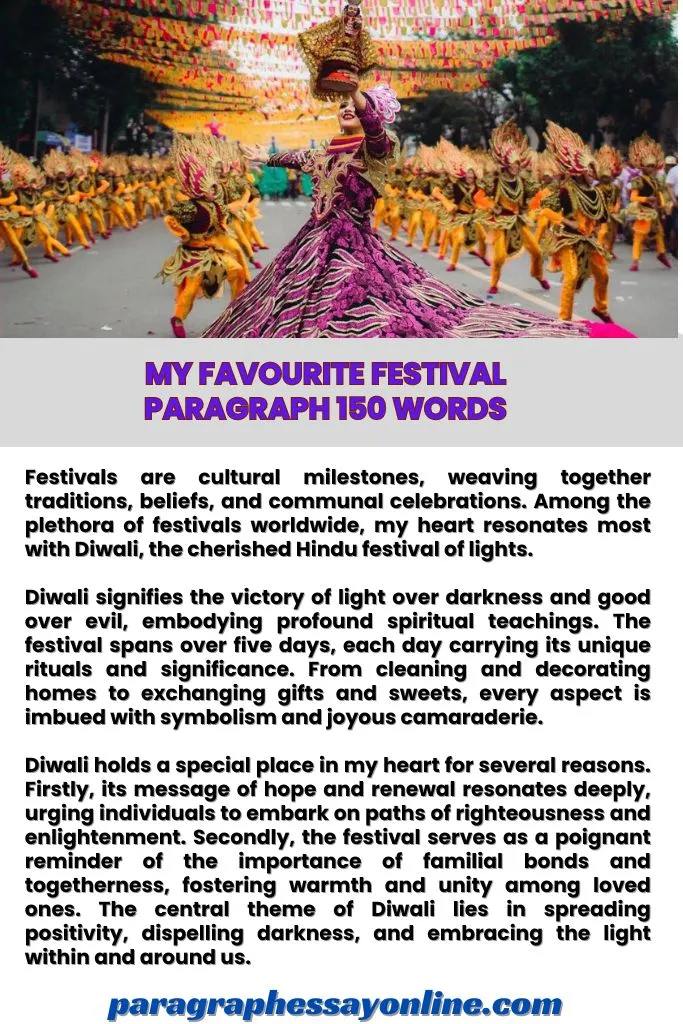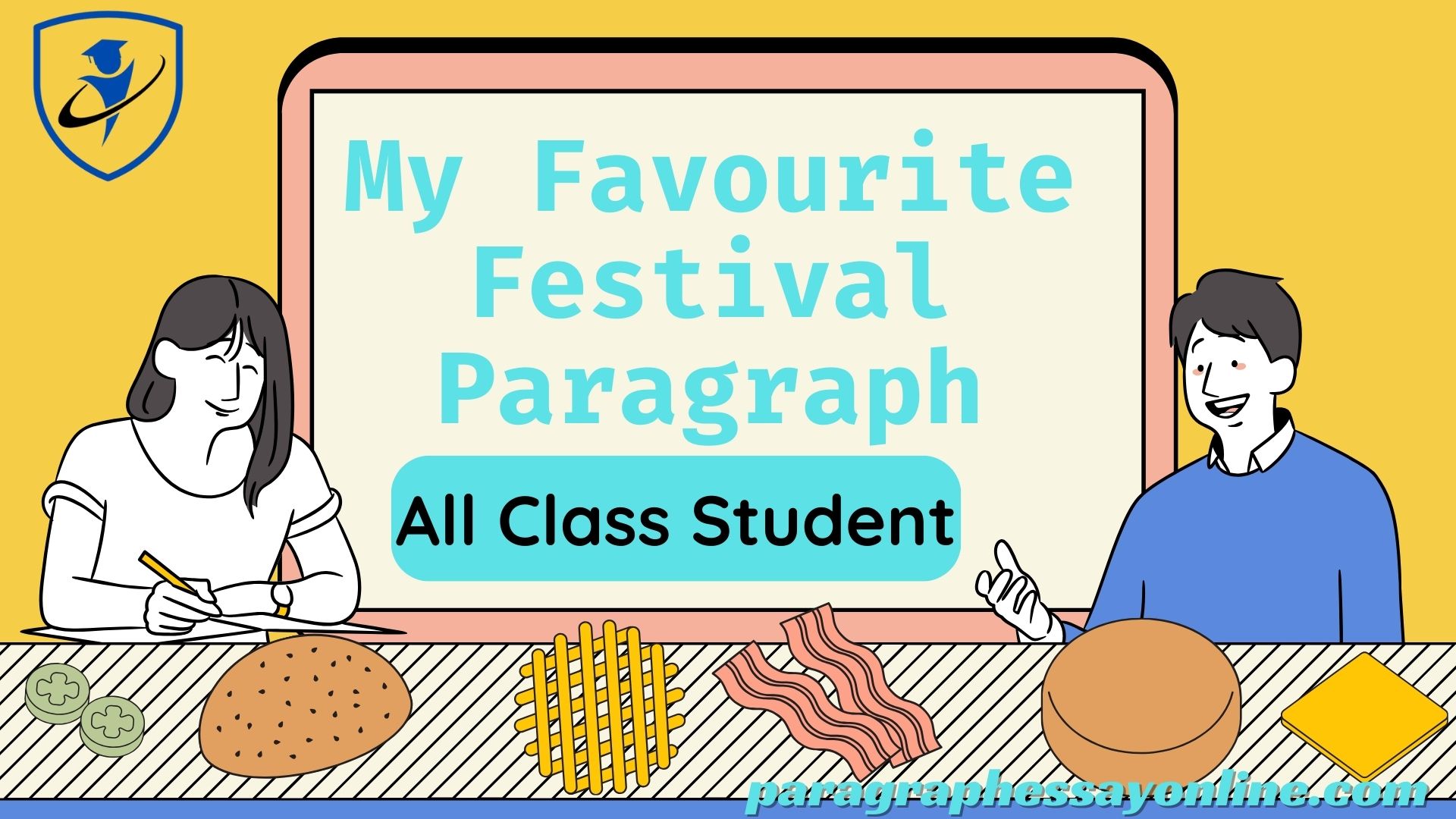My Favourite Festival Paragraph
My Favourite Festival Paragraph For Class 5, 6, 7, 8, 9 & 12
Festivals, like colorful strokes on the canvas of life, bring communities together in celebration, weaving threads of joy and tradition into the fabric of our existence. Among the kaleidoscope of festivities that dot the calendar, one stands out like a radiant beacon in my heart – a festival that transcends borders, transcends time, and fills my soul with an indescribable warmth
Paragraph On My Favourite Festival 100 Words For 1, 2, 3 Students
Festivals are vibrant expressions of culture, tradition, and community, marking significant moments or seasons throughout the year. My favorite festival is Diwali, the Hindu festival of lights, celebrated with fervor across worldwide.
Diwali signifies the triumph of light over darkness, good over evil, and knowledge over ignorance. It’s a time of illuminating homes with lamps, exchanging gifts, feasting on sweets, and bursting fireworks. What makes Diwali my favorite festival is its profound symbolism of hope, positivity, and unity.
The main point of Diwali lies in fostering bonds with loved ones, spreading joy, and embracing new beginnings. Additionally, its vibrant atmosphere, colorful decorations, and delicious delicacies add to the festive charm, making it an unforgettable celebration.

My Favourite Festival Paragraph 150 Words For 4 And 5 Students
Festivals are cultural milestones, weaving together traditions, beliefs, and communal celebrations. Among the plethora of festivals worldwide, my heart resonates most with Diwali, the cherished Hindu festival of lights. Diwali signifies the victory of light over darkness and good over evil, embodying profound spiritual teachings.
The festival spans over five days, each day carrying its unique rituals and significance. From cleaning and decorating homes to exchanging gifts and sweets, every aspect is imbued with symbolism and joyous camaraderie.
Diwali holds a special place in my heart for several reasons. Firstly, its message of hope and renewal resonates deeply, urging individuals to embark on paths of righteousness and enlightenment. Secondly, the festival serves as a poignant reminder of the importance of familial bonds and togetherness, fostering warmth and unity among loved ones.
The central theme of Diwali lies in spreading positivity, dispelling darkness, and embracing the light within and around us.

My Favourite Festival Paragraph 200 Words For 6, 7, 8 Students
Festivals are cultural phenomena that transcend borders, embodying the essence of tradition, spirituality, and celebration. Among the myriad of festivals observed worldwide, Diwali stands as a beacon of light and hope in the Hindu calendar. This festival, spanning over five days, heralds the victory of good over evil, symbolized by the illumination of countless lamps adorning homes and streets.
My fondness for Diwali stems from its multifaceted significance. Firstly, its spiritual connotations resonate deeply, reminding us of the eternal battle between darkness and light within ourselves and the world.
Secondly, Diwali serves as a joyous reunion for families and friends, fostering bonds through shared rituals, feasts, and laughter. The festival’s main point lies in its ability to instill optimism, unity, and gratitude among its celebrants, transcending barriers of caste, creed, and culture.
Moreover, Diwali’s vibrant ambiance, marked by colorful decorations, intricate rangoli designs, and the crackling of fireworks, evokes a sense of enchantment and wonder. Beyond its aesthetic appeal, Diwali encourages acts of charity and kindness, reinforcing the importance of compassion and empathy in society.
Ultimately, Diwali encapsulates the spirit of renewal, enlightenment, and communal harmony, making it a cherished and beloved festival for millions around the world, including myself.
My Favourite Festival Paragraph 250 Words For 8,9,10 Students
Festivals are cultural phenomena, serving as pivotal moments of celebration and reflection within societies worldwide. Among these cherished occasions, my heart resonates most with Diwali, the Hindu festival of lights. Diwali, observed over five days, holds profound spiritual significance, commemorating the victory of good over evil and the triumph of light over darkness.
The allure of Diwali lies in its ability to transcend mere festivities, offering a profound spiritual journey for its participants. The festival signifies the awakening of inner light and the pursuit of righteousness, guiding individuals towards self-reflection and renewal. As the glow of lamps illuminates homes and hearts, Diwali serves as a beacon of hope, inspiring optimism and resilience in the face of adversity.
The main point of Diwali rests in its message of unity and inclusivity, bringing together people of diverse backgrounds to celebrate shared values of love, compassion, and harmony. During Diwali, families gather to exchange gifts, share traditional meals, and offer prayers to deities, strengthening familial bonds and fostering a sense of belonging within communities.
Moreover, Diwali’s vibrant festivities captivate the senses, from the colorful decorations and mesmerizing fireworks to the tantalizing aromas of festive delicacies. Beyond the surface-level revelry, Diwali encourages acts of charity and compassion, emphasizing the importance of giving back to those in need and spreading joy to all.
In essence, Diwali embodies the essence of spirituality, cultural heritage, and communal celebration, making it a cherished festival for millions worldwide, including myself. Its timeless teachings of light, love, and togetherness continue to illuminate hearts and minds, transcending boundaries and uniting humanity in a shared celebration of life’s blessings.
My Favourite Festival Paragraph 300 Words For 9, 10, 11, 12 Students
My Favourite Festival Paragraph 500 Words
My favorite festival is Holi, also known as the Festival of Colors. It is celebrated with immense enthusiasm and joy across India, marking the arrival of spring and the victory of good over evil. Holi holds a special place in my heart due to its vibrant celebrations and cultural significance. During Holi, people come together to play with colors, splash water, and exchange greetings, spreading love and happiness.
In an academic context, Holi provides a unique opportunity for students to explore the cultural and historical aspects of the festival. Schools often organize special assemblies or cultural programs where students learn about the mythology and legends associated with Holi, such as the story of Prahlad and Holika. Through presentations, skits, and discussions, students gain insights into the religious significance and social customs of the festival.
Moreover, Holi fosters creativity and artistic expression among students. Many schools organize competitions for rangoli making, painting, and traditional dance performances during Holi. These activities allow students to showcase their talents, hone their skills, and express their cultural identity. Additionally, students learn about the significance of natural colors and eco-friendly practices to protect the environment during Holi celebrations.
Furthermore, Holi promotes social harmony and unity among students. Regardless of caste, creed, or background, people come together to celebrate Holi, breaking down barriers and fostering a sense of belonging. Schools often encourage students to celebrate Holi as a community, organizing events where students from diverse backgrounds can participate and interact. This promotes cultural exchange, mutual understanding, and respect for diversity among students.
Overall, Holi is more than just a festival; it’s a celebration of joy, friendship, and cultural heritage. It enriches the academic experience by providing opportunities for learning, creativity, and social interaction. Through its colorful festivities and meaningful rituals, Holi inspires students to appreciate the beauty of diversity and the power of unity in building a harmonious society.
Moreover, Holi promotes values of creativity, environmental sustainability, and community participation among students. Many organization competitions for making eco-friendly Holi idols, decorating pandals, and performing traditional dances during Holi. These activities not only encourage students to express their artistic talents but also promote awareness about the importance of protecting the environment and conserving natural resources.
Furthermore, Holi fosters a sense of unity and social cohesion among students. Schools often encourage students to participate in community service activities such as organizing food drives, cleaning campaigns, and cultural events during Holi. This promotes a spirit of camaraderie and cooperation, where students work together to create a positive impact on their communities.
Overall, Holi is more than just a religious festival; it’s a celebration of creativity, community, and cultural heritage. It enriches the academic experience by providing opportunities for learning, creativity, and social engagement. Through its festive traditions and meaningful rituals, Ganesh Chaturthi inspires students to embrace their cultural identity and contribute to the well-being of society. It enriches the academic experience by promoting cultural understanding, social responsibility. The festival’s exuberant atmosphere fosters a sense of belonging and cultural pride, enriching the academic journey with its lessons of inclusivity and celebration.
Most Important Paragraph:
| How To Make A Cup Of Tea Paragraph. |
| Mobile Phone Paragraph. |
| Paragraph About Friends. |
| Sundarban Paragraph. |
| Paragraph On Unemployment. |
Frequently Asked Questions For Paragraph On My Favourite Festival
1. What is the significance of celebrating festivals like Holi?
Answer: Holi, like many festivals, holds cultural, religious, and social significance. It symbolizes the triumph of good over evil, the arrival of spring, and the strengthening of bonds among communities.
2. How is Holi celebrated in different regions of India?
Answer: Holi celebrations vary across regions, with some places known for traditional rituals like Holika Dahan (burning of Holika) and others for exuberant public gatherings where people play with colors and water.
3. What are some common traditions associated with Holi?
Answer: Common traditions include playing with colored powders and water, preparing festive dishes like gujiya and thandai, and singing and dancing to traditional folk songs.
4. How do families celebrate Holi?
Answer: Families celebrate Holi by coming together for special meals, exchanging gifts and sweets, and participating in community events like bonfires and color play.
5. What is the significance of colors in Holi?
Answer: Colors are central to Holi as they represent the vibrancy of spring and the diversity of life. They also symbolize the victory of good over evil and the breaking down of social barriers.
6. Are there any safety precautions to keep in mind during Holi?
Answer: Yes, it’s important to use safe and natural colors, protect eyes and skin from irritation, and avoid excessive consumption of bhang (a traditional drink made from cannabis).
